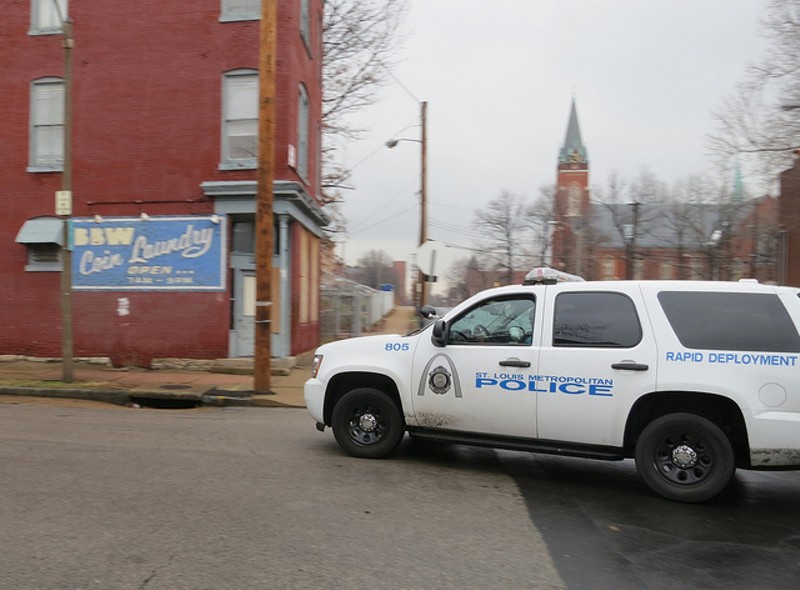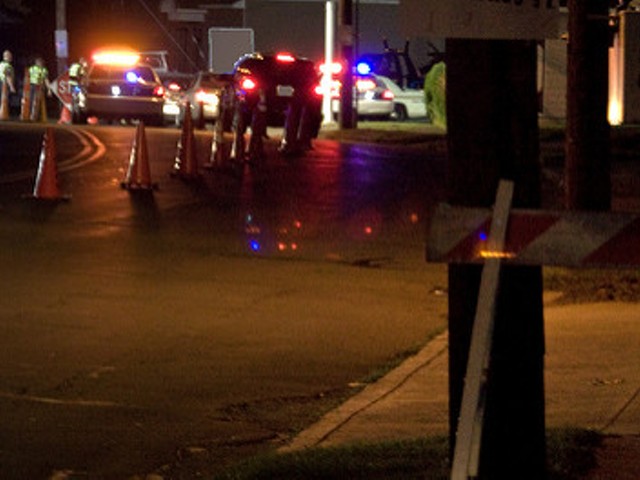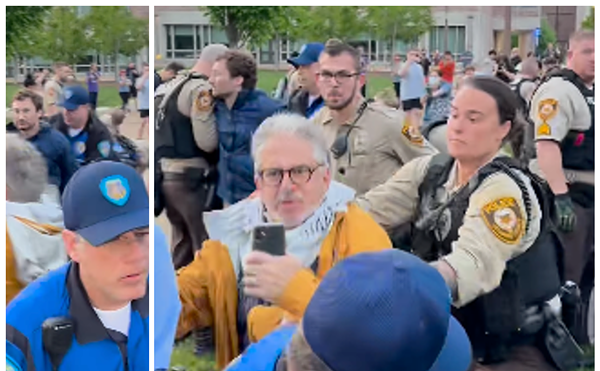
Photo via Flickr/Paul Sableman
A federal judge has denied requests from two St. Louis police officers to dismiss the lawsuit brought by a woman who was strip-searched during a traffic stop in 2012. That woman, Kayla Robinson, alleges that detective Angela Hawkins dragged her behind a trailer, shoved her hard enough to injure her shoulder and then, during the actual search, pulled down her underwear and touched the "inside" of Robinson's labial lips.
According to Robinson and her lawyer Jeremy Hollingshead, the invasive search was illegal and violated her Constitutional rights. And although Robinson admits that she handed over a bag of marijuana prior to the search, the detective admits that she found no contraband inside Robinson's vagina.
Notably, prosecutors declined to charge Robinson with any crime.
"The reason she wasn't charged is plain as day," says Hollingshead. "They didn’t want this to become public."
Robinson initially filed her lawsuit in St. Louis Circuit Court in 2016, about a year after she learned that the St. Louis Metropolitan Police Department's Internal Affairs division had investigated her complaint against Hawkins, and concluded that the complaint's allegations were "sustained." It is not clear whether Robinson was ever punished. (The department has previously declined the RFT's requests for comment on the matter, saying that records of officer discipline are closed to the public.)
On October 19, 2012, Robinson was being driven home to Overland following a Cardinals game. On Goodfellow Avenue, the driver of the car pulled a U-turn — a move that detective Hawkins spotted. The detective would later report that she believed the car was trying to avoid a checkpoint farther down the road.
But after pulling over the car, Hawkins claimed she saw the driver furtively handing something to the 24-year-old Robinson. At that point, the stories of detective and suspect significantly diverge, and Hawkins' version, as recorded in her official report of the incident, has some pretty big holes in it.
In an April 6 order denying Hawkins' request for summary judgment, allowing the suit to proceed to trial, U.S. District Judge Patricia Cohen noted, "It is undisputed that the incident report contained numerous inaccuracies."
Those inaccuracies were revealed by later depositions and surveillance footage of the search. The incident report, Cohen continued, failed to mention that Hawkins had taken Robinson into a parking lot to conduct the search, or that the suspect was "crying hysterically and repeatedly asking to be searched at the police station."
"Perhaps most significantly," the judge added, the incident report claimed that the suspect had declined to offer a written statement. It turns out that Robinson had, in fact, written a statement that explicitly complained about an abusive search. But the officer who wrote the incident report, Kelli Swinton, simply left that part out.
And Swinton, it's worth noting, was not on the scene of the search.
"It was unusual for an investigating officer not to draft his or her own report," the judge pointed out. "Defendant Hawkins did not complete a supplemental report or correct Officer Swinton’s report."
Swinton is also named as a defendant in the suit. In the ruling, Judge Cohen also refused to dismiss a separate count accusing Swinton and Hawkins of conspiracy. Cohen concluded that it was possible a jury could find that the officers "reached a meeting of the minds to omit pertinent facts from the police report relating to the search and to exclude [Robinson's] statement from the final report."
Beyond the matter of conspiracy, Hawkins' stated justifications for the search also raised questions. According to the judge's order, Hawkins initially claimed she had a "hunch" that Robinson was concealing a weapon in her vagina, and that "officer safety" required the search be done on the spot, instead of waiting to transport Hawkins to the station.
However, in a deposition, Hawkins backtracked.
"Tellingly," Judge Cohen wrote, "Defendant Hawkins no longer claims that her decision to conduct a strip search was based upon concern for officer safety. Rather, Defendant Hawkins asserts that, after Plaintiff advised her that she had marijuana in her possession, she had probable cause to search Plaintiff for drugs."
Hawkins also appeared to admit that she'd violated departmental policy, Cohen wrote, since she hadn't obtained a commanding officer's approval to conduct the strip search.
Cohen wrote, "In light of the conflicting testimony, genuine issues of fact exist relating to the scope of the strip search and the manner in which it was performed" — and those issues, the judge concluded, require a trial to resolve.
Previously, Hawkins and Swinton countered that their actions were protected by qualified immunity and so they cannot be sued. They are appealing Judge Cohen's denial of their motion for summary judgment.
Follow Danny Wicentowski on Twitter at @D_Towski. E-mail the author at [email protected]
- Sign up for our weekly newsletters to get the latest on the news, things to do and places to eat delivered right to your inbox.
- Follow us on Facebook, Twitter and Instagram.





